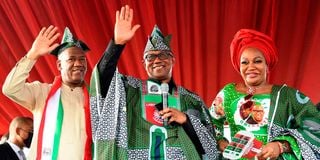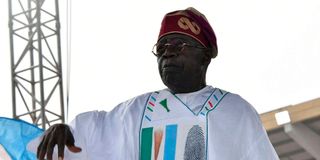Peter Obi: The Nigerian ‘Hustler’ causing ripples

Labour Party's Presidential candidate Peter Obi (centre), flanked by wife Margaret and his running mate Yusuf Datti Baba-Ahmed, greets supporters during a campaign rally at Adamasingba Stadium in Ibadan, southwestern Nigeria, on November 23, 2022, ahead of the 2023 Nigerian presidential election.
What you need to know:
- A ‘hustler’ movement, akin to the euphoria William Ruto rode to State House, Nairobi, in August 2022, is taking Africa’s most populous nation by storm.
- Peter Gregory Obi, the Labour Party flagbearer, has been elevated to earthly sainthood and is waging a war of political and economic deliverance against septuagenarian heavyweights— Atiku Abubakar (PDP) and Bola Ahmed Tinubu (APC).
- Like the Kenyan ‘hustler-in-chief’, he insists he has “the people” as his rivals deploy elected leaders and well-oiled campaign machines anchored on party structures in cities and villages.
In a Kenya-like fashion, another David versus Goliath political battle is shaping up in Nigeria ahead of the country’s Saturday presidential election.
A ‘hustler’ movement, akin to the euphoria William Ruto rode to State House, Nairobi, in August 2022, is taking Africa’s most populous nation by storm.
A billionaire who made his fortune in business and banking is winning minds and hearts in their millions by selling hope as he cuts the image of the ‘messiah’ of the poor, the marginalised and the downtrodden.
Peter Gregory Obi, the Labour Party flagbearer, has been elevated to earthly sainthood and is waging a war of political and economic deliverance against septuagenarian heavyweights— Atiku Abubakar of the People’s Democratic Party (PDP), a former vice-president, and Bola Ahmed Tinubu of the ruling All Progressives Congress (APC), the former governor of Lagos.

Candidate of the opposition Peoples Democratic Party (PDP) Atiku Abubakar gestures during a campaign rally in Kano, northwest Nigeria, on February 9, 2023, ahead of the February 25 presidential election.
"Anti-dynasties"
Like Dr Ruto, the 62-year-old former governor of South East Anambra State has fashioned himself as anti-dynasties and the old order and believes he is the antidote to godfather politics that has dominated the former British colony since its return to civilian rule in 1999.
In his trademark black native attire, “two pairs of shoes”, and with just a few aides walking beside him during campaigns, Obi’s public image is not that of a typical Nigerian politician: swanky, flashy, extravagant and demi-god-like.

Candidate of the ruling All Progressives Congress (APC) Bola Tinubu gestures during the final campaign rally of the party at Teslim Balogun Stadium in Lagos, on February 21, 2023. He has taken an early lead.
Yet, he belongs to the very class he has turned his back on. A philosophy graduate from the University of Nigeria, he made his fortune importing virtually everything from salad cream to beauty products, champaign and baked beans. He also operated a brewery and holds major shares in several commercial banks.
Running on a fringe party ticket with no single sitting governor, senator and member of the House of Representatives, Obi is banking on ordinary persons to deliver themselves from bad governance, rank corruption, harsh economy and runaway insecurity.
Like the Kenyan ‘hustler-in-chief’, he insists he has “the people” as his rivals deploy elected leaders and well-oiled campaign machines anchored on party structures in cities and villages.

Supporters of Nigeria’s Labour Party hold posters during a global march for the presidential candidate of Labour Party (LP) Peter Obi, in Abuja, Nigeria on February 18, 2023, ahead of the Nigerian presidential election scheduled for February 25, 2023.
“The 100 million Nigerians who live in poverty will be the structure. The 35 million Nigerians who don’t know where their next meal will come from will be the structure,” he says in a near echo of Dr Ruto, whose freshly minted United Democratic Alliance nearly took control of Kenya’s National Assembly and the Senate.
"The structure that has kept us where we are, the structure that has produced the highest number of people in poverty in any country, the structure that has produced the highest number of out-of-school children, that is the structure we want to remove.”
Resource mobilisation
And Nigerians are listening, with millions both home and abroad identifying themselves as “Obidients”, and going ahead to use their own resources to launch campaigns for their man online and offline.

A banner is seen during a global march for the presidential candidate of Labour Party (LP) Peter Obi, in Abuja, Nigeria on February 18, 2023 ahead of the Nigerian presidential election scheduled for February 25, 2023.
They have taken to the streets, flying the Labour Party flag over Lagos, funded billboards emblazoned with Obi’s images and donated offices across the country to be used for campaign planning and coordination.
An outsider candidate that political pundits had dismissed, just like they nicknamed him “Obi the Boy” when he ran for the governor seat in 2003, the banker is causing major upsets in the race.
The latest opinion poll by NOI Polls Limited shows both Abubakar, 75, and Tinubu, 70, trailing him in the contest to succeed President Muhammadu Buhari.
In the survey, 21 per cent of participants said they would vote Obi compared to 13 per cent proposing to back Tinubu and 10 per cent in favour of Abubakar. More than 50 per cent of respondents, however, were either undecided or refused to answer— with the pollster saying Obi’s lead is “significant but not sufficient to separate him from” the pack.

Supporters of Nigeria’s Labour Party, react during a global march for the presidential candidate of Labour Party (LP) Peter Obi, in Abuja, Nigeria on February 18, 2023 ahead of the Nigerian presidential election scheduled for February 25, 2023.
So far, Obi has been able to break the ethnic politics that had dogged the country since independence, having penetrated the major ethnic groups that are in the forefront of the campaigns to the consternation of his rivals and onlookers.
A devout Catholic from eastern Nigeria, the choice of Yusuf Datti Baba-Ahmed, a Muslim from the North, as his running mate has boosted his chances of becoming the first Igbo indigene to lead the fractured federal republic.
Popular with youth
And with his reputation for good governance and his disdain for the trappings of office, he has become a hit with the youth and represents a far more plausible candidate for change than Abubakar and Tinubu, whose candidatures are tainted with corruption allegations.
"It's time to take your country back," Obi often says in his rallies.
He has succeeded to harness the youth vote where many failed— managing to bridge religious, regional, ethnic and digital divides.

Supporters of Nigeria’s Labour Party parade in the streets during a global march for the presidential candidate of Labour Party (LP) Peter Obi, in Abuja, Nigeria on February 18, 2023, ahead of the Nigerian presidential election scheduled for February 25, 2023.
Seventy per cent of Nigeria’s population is under the age of 30 and the energised constituency that is keen to turn the tables on the old guard has proved to be his single biggest asset in the campaigns.
Like Ruto in Kenya’s election, to the youthful Nigerian voters, Obi represents a break from the past, fresh hope and the Nigerian dream that has proved elusive for a majority of the 220 million people.
"[This election] is the old against the new," he recently told the BBC in an interview.
Online and offline, the young army of Labour Party campaigners amplify his messages of prudence and accountability as their candidate promises to replicate his successes as governor— saving public money, heavy investment in education and boosting workers’ morale.
"We don't give shishi (money)", for instance, has become a buzzword among Obi’s diehards as they sell his manifesto for prudent management of government funds.
"Leadership coup"
Analysts say the mostly urban youth are keen to replicate their 2020 success when they stood up and won against a dreaded killer police squad— the Special Anti-Robbery Squad, a disbanded unit that was notorious for illegal detention, torture, extortion and killings.
They are using the same mobilisation and fundraising strategies and structures they employed during the anti-police riots to stage a leadership coup at the ballot.
The dogged fighters, with the support of most of Nigeria’s social media influencers, have taken their mainly online campaigns to every nook and cranny of the 36 states and the federal capital territory.

A campaign banner of candidate of Labour Party Peter Obi and running mate Datti Baba-Ahmed is displayed in Aguru in Anambra State, southeast Nigeria, on February 17, 2023.
“This is the first time that the youths largely in their 30s are taking over the political landscape in an election that is woven around three major political parties against the two the country had witnessed since 1999 when the nation returned to civil rule,’’ says Alex Ogedengbe, political analyst, who sees Obi as the “light that will lead the wealthiest African nation out of its present doldrums”.
Most of these youth are restive, and worried and want Nigeria bailed out of oppression, brutality, corruption, criminality, violence, terrorism, debt and economic mess.
“These youths are soldiers marching to liberate Nigeria through the election of Peter Obi,” says Hakeem Fashoro, a rights activist.
Despite his popularity, his detractors say Obi has no strong structure to win the presidential election, which requires simple majority votes plus 25 per cent votes in at least 25 states.
The ruling APC has grip and governors in 21 states; the opposition PDP has 14 states; while the All Progressive Grand Alliance, Obi’s former party, keeps one state.
His opponents also say he lacks the nationwide popularity to win the election and is an “unnecessary” distraction from the common goal of vanquishing APC, by splitting the opposition vote.
Others have poured cold water on his anti-corruption manifesto after his name was featured in the leaked Pandora Papers in 2021, indicating that he failed to declare wealth hidden in offshore accounts.
And while his victory is a matter of wait and see, the career banker can bank on the fact that if he wins he will inherit a besieged country economically, politically and socially.
The ‘hope pregnancy’ of his Obidients will also be due and, like Dr Ruto, he will most likely struggle to deliver on some of his lofty campaign pledges.






